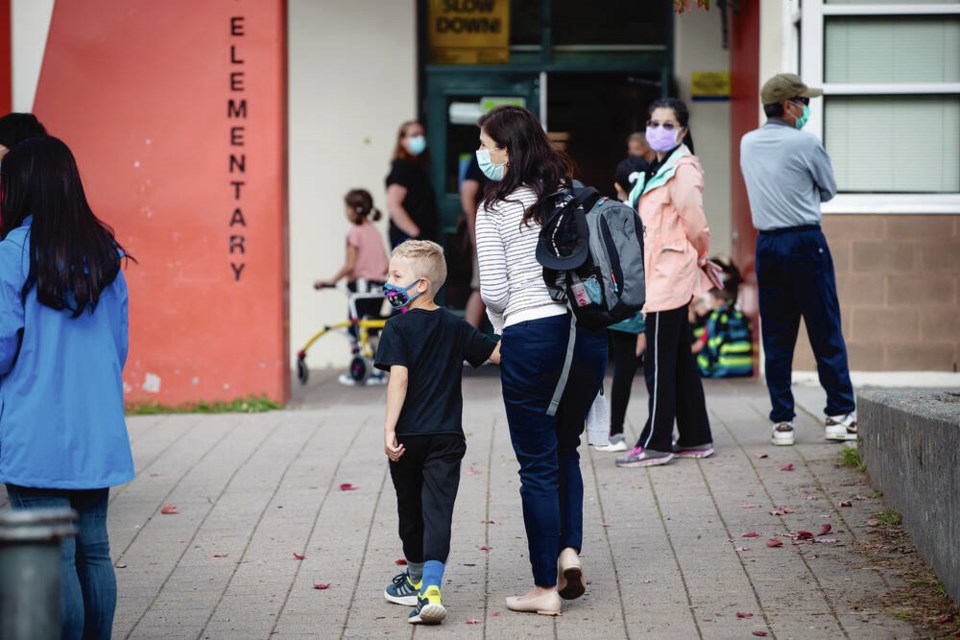B.C.’s schools are set to fully open Monday, despite a surge in COVID-19 cases as a result of the Omicron variant — although some parents plan to keep their children home.
Provincial health officer Dr. Bonnie Henry said at a Friday news conference that the province has been working closely with school districts as they brought in enhanced COVID-19 protocols over the past week, when schools were only open to children with special needs or those whose parents are front-line workers.
Districts have been gathering supplies of three-layer masks, planning for staggered breaks to reduce crowding and doing away with face-to-face seating arrangements.
Henry said some concern among parents — especially those with vulnerable family members — is understandable, but schools are safe places to be, because of the structure in place.
“We know that there is a lot of anxiety and it is always a challenge when we have more illness in our communities, how that’s going to affect school.”
Kassandra Stafford, whose two children attend school in the Sooke School District, said neither will be attending until this wave of COVID is over, even though she realizes the benefits of in-person learning.
“Both my kids are autistic, so the social aspect of being in school is really important,” said Stafford.
But her son, who is in Grade 5, was hospitalized with influenza when he was in Grade 1 and the effect on his immune system means he hasn’t been able to get fully vaccinated yet, said Stafford, who is also hesitant to send her daughter back to kindergarten.
Winona Waldron, president of the Greater Victoria Teachers’ Association, said she also has reservations about the return to classes, and believes many people will wait to send their children back to school.
“We are preparing for a great deal of people getting sick.”
Waldron said little has changed when it comes to preventing spread of the virus in schools — there is no more contact tracing in schools and she hasn’t heard any recent talk about ventilation measures.
Cendra Beaton, who also lives in the Sooke district, is sending her children to school but will be keeping a close eye on things. “There’s always concern because there’s so much unpredictability,” she said.
News about pediatric COVID cases in Ontario heightens that concern, said Beaton, who has a daughter in Grade 8 and a son in Grade 5. “B.C. tends to trend just behind them.”
Beaton said she is eager to see exactly what safety measures are in place when school starts.
Henry said vaccination among school staff is high, and she would like to see all children who are eligible get vaccinated, as well.
“School is essential,” she said. “We know it is the best place for children to be.”
Still, there will undoubtedly be some “rocky times” at schools in the next few weeks, Henry said.
Education Minister Jennifer Whiteside said Friday that Omicron presents “a new and very different phase” to the pandemic.
“While our goal is to have students learning in classrooms, we recognize that there will be likely temporary shifts in how and where some students learn,” Whiteside said. “This means that learning at home may be in place for some students over the coming weeks or months.”
On Monday, students will get “a refresher” on a range of safety measures, like how best to use a mask, she said.
Whiteside said that part of the process for assessing how schools are doing with the virus will be to monitor attendance rates closely, and report to public health officials and the school community if it falls below typical rates.
Public health will respond with an investigation that could include rapid-antigen tests.
Henry said rapid-antigen tests for COVID-19 will be used to help manage outbreaks in the K-12 system in the next few weeks.
Rapid testing at schools is expected to begin next week, and could include testing for children who are symptomatic, said Henry, adding B.C.’s supply of tests is expected to increase in the weeks ahead.
Henry said Omicron has made this time of the year more of a challenge than ever.
“The days are cold and still short and this puts an added burden on us all,” she said. “Go outside, go for a walk, call a friend.”




